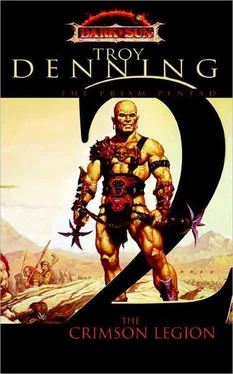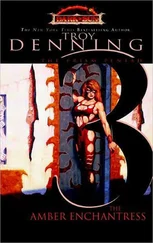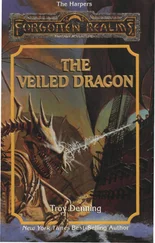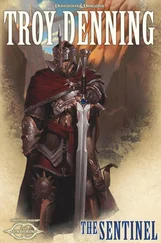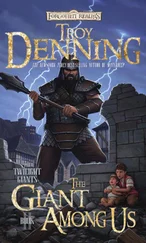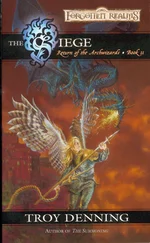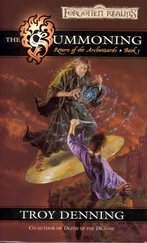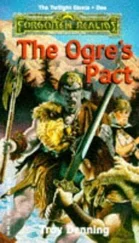Troy Denning - The Crimson Legion
Здесь есть возможность читать онлайн «Troy Denning - The Crimson Legion» весь текст электронной книги совершенно бесплатно (целиком полную версию без сокращений). В некоторых случаях можно слушать аудио, скачать через торрент в формате fb2 и присутствует краткое содержание. Год выпуска: 1992, ISBN: 1992, Издательство: TSR, Жанр: Фэнтези, на английском языке. Описание произведения, (предисловие) а так же отзывы посетителей доступны на портале библиотеки ЛибКат.
- Название:The Crimson Legion
- Автор:
- Издательство:TSR
- Жанр:
- Год:1992
- ISBN:9781560762607
- Рейтинг книги:5 / 5. Голосов: 1
-
Избранное:Добавить в избранное
- Отзывы:
-
Ваша оценка:
- 100
- 1
- 2
- 3
- 4
- 5
The Crimson Legion: краткое содержание, описание и аннотация
Предлагаем к чтению аннотацию, описание, краткое содержание или предисловие (зависит от того, что написал сам автор книги «The Crimson Legion»). Если вы не нашли необходимую информацию о книге — напишите в комментариях, мы постараемся отыскать её.
The Crimson Legion — читать онлайн бесплатно полную книгу (весь текст) целиком
Ниже представлен текст книги, разбитый по страницам. Система сохранения места последней прочитанной страницы, позволяет с удобством читать онлайн бесплатно книгу «The Crimson Legion», без необходимости каждый раз заново искать на чём Вы остановились. Поставьте закладку, и сможете в любой момент перейти на страницу, на которой закончили чтение.
Интервал:
Закладка:
Just when Rikus was about to ask how much farther they had to go, the tunnel opened up into a small chamber. The path led to a small stone walkway that looked as though it had once been a bridge. Beside this causeway lay more than a dozen weapons of various materials. Several of them looked to be quite ancient, judging by the rot of their wooden handles or the yellowed brittleness of their bone blades.
Two of the weapons, however, were quite new. A pair of obsidian short swords lay to one side of the bridge, the white fingers of a man’s lifeless hand still gripping the hilt of each weapon. The remainder of the bodies were not visible, having slowly sunk into the powdery sand that now filled the moat beneath the bridge. Still, Rikus had no doubt that the swordsmen wore the red tunic of Hamanu’s soldiers, for the shape of their weapons was identical to those carried by the rest of the Urikite legion.
A deep, full-bellied laugh escaped Lyanius’s lips and echoed off the still walls of the sandy cavern. “Heed the words of the ancients, or such will be your end,” he said, leading the way across the bridge.
On the other end of the bridge the small group stopped beneath the arched gateway of a magnificent stone wall. Inscribed into the spandrel were several strange runes that Rikus took to be the letters of a written language.
“Beyond this gate, place your trust in the strength of your friendship, not the temper of your blade,” translated Lyanius, a crooked smile on his ancient lips.
The old dwarf led them to a gateway, where, a few feet above Rikus’s head, hung a portcullis of rusty-red iron. It was supported by thick chains that disappeared through a set of openings into the gatehouses that flanked the pathway. The walls of these buildings were constructed of white marble, so finely cut and carefully fit together that even a sliver of torchlight could not have slipped between them.
“Welcome to Kemalok, lost city of the dwarven kings,” Lyanius said, waving his guests through the gate.
“I’ve never seen so much iron in one place,” Neeva said, running her gaze from the portcullis to the chains. “What king could afford this?”
“What you see here is nothing compared to the wonders of the keep,” bragged Caelum. “Follow me.”
The dwarf stepped beneath the portcullis. When Neeva and Rikus tried to follow, a chest-high figure stepped from around the gatehouse corner and blocked their path. It wore a complete suit of black plate mail, trimmed at every joint in silver and gold. In its hands the figure held a battle-axe with a serrated blade of steel flecked with scintillating lights, and its helm was capped by a jewel-studded crown of gleaming white metal, the like of which Rikus had never before seen.
As magnificent as the figure’s armor was, it was the thing’s eyes that arrested Rikus’s attention. The orbs were all that was visible of a face swaddled in green bandages, and they burned with a glow as yellow as the afternoon sky.
“Don’t move!” commanded Caelum.
Rikus obeyed, as did Neeva. The mul had no idea what the thing was, but he knew he did not wish to anger it.
“Rkard, last of the great dwarven kings,” explained Lyanius, stepping back to them. He brushed past the mummified king as casually as he moved past his own son. “He means you no harm. Show him that you bear no weapons.”
Rikus and Neeva did as Lyanius asked. When they faced forward again, Rkard stepped aside. As soon as the two gladiators passed, the ancient king again blocked the gate.
“Strange,” mumbled Lyanius.
“Maybe there are more Urikites around,” Rikus suggested, peering into the darkness on the other side of the moat.
“Don’t be daft,” the old dwarf snapped, pointing at the two obsidian swords stuck in the moat. The hands previously wrapped around the hilts had vanished completely. “Two Urikites came in, and two have died.”
With that, Lyanius led the rest of the way through the gate. On the other side, a confusing warren of tunnels branched off in a dozen directions, leading down what had once been the grand avenues and hidden alleys of a sizable metropolis. The greatest part of Kemalok still lay buried under mounds of sand, but enough of it showed for Rikus to see that most of the buildings were constructed of granite block. The five-foot doors and narrow, chest-high windows left no doubt that this had, indeed, been a dwarven city.
Caelum guided them down the widest tunnel, while Lyanius explained, “I found Kemalok two hundred years ago.”
“How?” Neeva asked.
“I happened upon a short section of parapet the wind had uncovered,” Lyanius answered, a faintly amused smile on his wrinkled lips. “I knew instantly I had found a dwarven city from the time of the ancients. The merlons were too short for you people, and the stonecraft was far beyond anything the paltry masons of our age can achieve.”
The old dwarf went on to describe the next century and a half of excavations, working alone at first, and eventually coming to be the leader of an entire village focused upon the eventual reestablishment of Kemalok. Rikus paid him only cursory attention. Instead, the mul listened for footfalls behind them and glanced over his shoulder every few steps. The fact that the door guarding this secret city had “opened of its own accord” set his nerves on edge, and he did not place much faith in Lyanius’s body count.
Eventually they came to another bridge leading to a gate. This time, the bridge was made of wooden planks, now half-rotten and patched here and there with the wide, flat ribs of a mekillot. Caelum pushed open an immense set of iron doors, then led them through a short tunnel lined by chest-high arrow loops. On the other side, Lyanius’s dwarves had dug a series of vaults, revealing the outer bailey of a great castle.
As they passed through this area, Rikus peered into the windows of what had been the shops and homes of the castle’s smiths, tanners, fletchers, armorers, and a dozen other craftsmen. Their tools, made mostly from steel and iron, still hung in the racks where they had been neatly stored thousands of years ago. Rikus could not help gaping at the vast treasury of metal.
They passed through another gate and into the inner bailey. In the center of this courtyard, a square keep of white marble rose high overhead, the roof lost in the sand overhead. At each corner of the keep stood a round tower, its arrow loops commanding much of the courtyard below.
“This is the Tower of Buryn, home to dwarven kings for three thousand years.” Lyanius proudly opened the doors.
“Three thousand years?” gasped Neeva. “How do you know?”
The old dwarf frowned at her as if she were a child. “I know,” he answered, motioning her and Rikus inside.
On each side of the entrance foyer sat a pair of stone benches, one sized for the short legs of the dwarves and one for the longer legs of humans. In the corners stood full suits of dwarven plate, the shaft of a double-bladed battle-axe gripped in the armor’s gauntlets. Both the armor and the weapons were made of polished steel, gleaming as brilliantly as the day they had been forged.
Remembering the greeting they had received at the city gates, Rikus cautiously studied the fantastic armor. Fortunately, behind the helms’ visors he saw neither gleaming eyes nor anything but dark emptiness. Nevertheless, the mul did notice that the suits were too small for a dwarf. While they were about the right height, they were far from broad enough for the massive shoulders and bulging limbs typical of the dwarven race.
Noticing the mul’s careful study of the armor, Lyanius said, “Our ancestors were not as robust as we are today.” The old dwarf’s cheeks reddened and he looked away. “They even had some hair.”
Читать дальшеИнтервал:
Закладка:
Похожие книги на «The Crimson Legion»
Представляем Вашему вниманию похожие книги на «The Crimson Legion» списком для выбора. Мы отобрали схожую по названию и смыслу литературу в надежде предоставить читателям больше вариантов отыскать новые, интересные, ещё непрочитанные произведения.
Обсуждение, отзывы о книге «The Crimson Legion» и просто собственные мнения читателей. Оставьте ваши комментарии, напишите, что Вы думаете о произведении, его смысле или главных героях. Укажите что конкретно понравилось, а что нет, и почему Вы так считаете.
